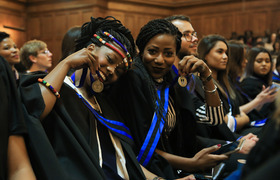Three new research themes for UCT
22 May 2007UCT has added three new Signature Themes to its repertoire - work designed to boost research excellence while also growing research capacity in areas of prioritised need.
Minerals to Metals, Cities in Africa and Drug Development up the university's total of signature themes to five. The three new entries join the Brain-Behaviour Initiative (BBI) and the Marine Research Institute (MA-RE), both launched in 2006, on the list.
The establishment of interdisciplinary research focus areas, or UCT Signature Themes, was endorsed by the University Research Committee (URC) and approved by the Senate Executive Committee in 2004. These bodies saw the need for researchers to collectively tackle research problems in areas of regional and national value.
Since then, the success of signature themes has positioned the university well to respond to banner national programmes such as the South African Research Chairs Initiative (SARChI) and the National Research Foundation's (NRF) research niche areas (RNAs).
Four of UCT's five signature themes were accepted as RNAs in 2006, and three themes - BBI, Drug Development and Minerals to Metals - have already received Institutional Research Development (IRDP) grants from the NRF for 2007.
Both the BBI and MA-RE signature themes were awarded SARChI research chairs in 2006.
Selected themes are supported by a limited amount of seed funding from the URC, says Dr Therina Theron of the Department of Research and Innovation. But themes are expected to develop sustainable operations and serve as strong platforms to leverage external funding.
Minerals to MetalsThe theme will boost research on minerals beneficiation - the sequence of processes that produce metal from low-grade ore - from two main perspectives.
The first is fundamental, and will focus on underlying scientific areas within minerals beneficiation. The second - systemic - approach will consider the entire extraction chain to improve process performance, minimise the use of water and power, cut back on waste, and promote cleaner production options and technologies, as well as inherently safer process design.
Under the leadership of Professor Jean-Paul Franzidis of the Department of Chemical Engineering, the theme will integrate the research activities of four established research groupings - the Centre for Minerals Research, the Bioprocess Engineering Research Unit, the Crystallisation and Precipitation Research Unit, and the Environmental and Process Systems Engineering Research Group - to address key challenges facing the minerals industry in South Africa.
For too long these groups have worked independently, says Franzidis. After all, he adds, "each delivers the feed-material to the next group". What the signature theme aims to do is bring them together under one umbrella to look at the process as a whole.
Right now, Minerals to Metals is up and running, with four master's projects already under way.
Cities in AfricaThis new theme will establish an inter-disciplinary research and teaching centre, based in the Faculty of Engineering & the Built Environment (EBE), but linking urban-related work across the university. The work will be helmed by Professor Vanessa Watson of the School of Architecture and Planning and Professor Sue Parnell of the Department of Environmental and Geographical Science (EGS).
In motivating for the theme, the researchers argued that cities are too complex to be seen as the preserve of one discipline. As a result, research will draw together work from departments across the EBE (such as waste management, transport, city planning and design) and from other faculties as well.
These include the faculties of science (EGS's work on climate change and food security), health sciences (promoting "healthy cities") and humanities (urban society and culture). Urban infrastructure and planning, the environment, governance, and space and culture will form initial research foci.
The teaching arm of the initiative - the Urban Infrastructure Design and Management master's programme - was established in 2006 with Ove Arup funding. The theme will also forge a close partnership with those in the public and private sectors.
"As an independent think-tank and lobby group, the theme will provide a new 'voice' from the global South on urban issues," said Watson.
Drug DiscoveryUCT experts are pulling together to develop a virtual drug-discovery biotech/pharma "company" within an academic environment.
Protein specialists, chemists, pharmacologists, bioengineers and clinicians - hailing from the science, health sciences and engineering faculties - will work on the production of safe and effective medicines to combat global health risks such as HIV/AIDS, tuberculosis, malaria and cardiovascular disease.
Professor Edward Sturrock, theme director, reports that various projects are underway on the Big Three - HIV, TB and malaria - as well as hypertension. Researchers have also developed a model structure for a drug-discovery cycle.
A key element of drug design is the ability to visualise potential drugs in the active sites of target proteins, says co-director Professor Trevor Sewell. "With the technology of structural biology readily available to South African researchers, we are now able to do this."
The individual technologies involved in the drug-production pipeline - from therapeutic target identification to the production of a drug - are becoming more streamlined and sophisticated, say the UCT researchers. That promises greater success rates, but also poses a challenge for developing countries to become part of the discovery process.
 This work is licensed under a Creative Commons Attribution-NoDerivatives 4.0 International License.
This work is licensed under a Creative Commons Attribution-NoDerivatives 4.0 International License.
Please view the republishing articles page for more information.










